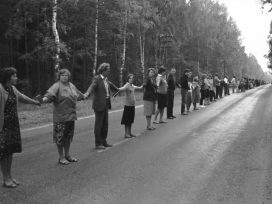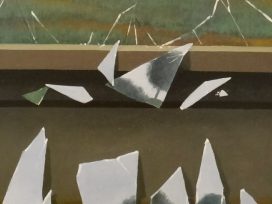The topic of “neighbourhood” has probably never been more of a burning issue in eastern European than today, both in terms of physical geography and political space. The annexation of Crimea and military action in eastern Ukraine have destroyed the illusion of
stable borders post-1990, jeopardizing the chances for peaceful neighbourhoods throughout Europe. Having seen what has already happened in Transnistria and South Ossetia, it is quite possible that the “unresolved” question of Russian activities in Ukraine might trigger similar “conflicts” with other “neighbouring” countries, particularly now that the Russian government no longer seeks to conceal its imperial paradigm. This is also certain to affect the geopolitical situation in Europe in general. In this context, it is hardly surprising that countries such as Lithuania, Belarus and Estonia have voiced concern regarding their own autonomy. In light of their centuries-old experience of being Russia’s “neighbours”, questions such as
Is Lithuania next? Or will it be Belarus? Or perhaps Narva? are fully justified.
This is why discussion of this topic seems more crucial today than ever, especially for former Soviet bloc countries, because of the multiple traumas linked to their “shared history”, first as part of the Russian empire and later of the Soviet Union, and subsequently their status as neighbours of present-day Russia. Many of these traumas have yet to be properly discussed and processed by the global community, which continues to regard the post-Soviet space as a single entity or, more precisely, a region, rather than in terms of individual autonomous entities. In this respect, the choice of venues for the Neighbourhood in Europe conference series is quite symbolic: Narva, a city in Estonia situated close to the border with Russia, with a dominant Russian-speaking population; Kharkiv in eastern Ukraine; Vyborg, a city in Russia from which the Finnish population was banished in 1940. Minsk is the only location that may seem accidental in geographical terms, although the choice is fully understandable given that in the case of Belarus it is not just a specific part of the country but rather the country as a whole that is under threat. All these localities have a complex historical legacy and ambiguous models of identity, which makes them especially vulnerable in the current situation.
Are these discussions of neighbourhood likely to bring about change in the absence of official representatives of the Russian government, whose policies currently pose a threat to their neighbouring countries? Of course not. Rather, their main task seems to me to be to identify the differences (rather than the similarities) in the situations of the participating countries, as these are rarely discussed. Indeed, it is quite possible that a realistic idea of peaceful neighbourly relations will emerge only once the post-Soviet space is decentralized not only in geopolitical terms but, first and foremost, culturally and mentally.
The focus of discussions in Narva on language and literature highlighted a range of differences as regards identity viewed through the lens of history and culture. And it is precisely a feeling for these differences that would be important when asserting the autonomy of former Soviet bloc countries, not only, and not in the first place, from Russia, but also from one another. In this respect, the European project provides an alternative vision – of a union in which it is possible to accept and assert differences while ensuring that the identities of individual entities are not threatened. (Of course, this kind of union does invite conflicts, primarily in terms of the co-existence of entities in differing historical, social and cultural settings. But that is a quite separate European issue).
One of the key questions for discussions in Narva was that of the Russian language in the Estonian context. The issue of the Russian language in differing national contexts is of course rather a delicate one. But again, framing the discussion from the perspective of Estonian society (as concerns the importance, role and place of the Russian language in its socio-cultural space, policies for the integration of national minorities, etc.) was helpful in highlighting important and often neglected particularities. For example, writer Jaan Kaplinski voiced his concern about the disappearance of Russian in the Estonian context as the vehicle for a particular culture – but it is virtually impossible to imagine a similar discussion in Lithuania or in Belarusian civil society, where national identity has been (and, in the case of Belarus continues to be) strongly under pressure from Russian culture over a long period. Responding to a question from the floor about why two state languages could not be instituted in, say, Estonia, the writer and dramatist Marius Ivaskievicius from Lithuania cited his country’s experience. He said that this might be possible in some three hundred years’ time: when the threat of the Russian language as the vehicle of a certain kind of politics has disappeared. (Contrast this with the example of Belarus, where the law instituting two state languages combined with discrimination against the Belarusian language brought Belarusian to the brink of extinction).
Thus the Belarusians, and probably also the participants from Lithuania and Ukraine, were rather bewildered by the suggestion that Russian needed to be defended and that someone might be genuinely concerned about the fact that the rising generations are no longer familiar with the language and do not read books in Russian. They were equally puzzled by what was missing from the discussions, namely any reference to the politicization of the Russian language today. Russian was instead spoken of exclusively in cultural terms, something that would be inconceivable in other locations. However, while this approach to the issue may have sounded puzzling to begin with, as the debates continued, they started to reveal other meanings and expose the peculiarities of the Estonian context, that is to say, to assert its uniqueness regardless of what is understood as the shared Soviet legacy.
Students present from Narva College and from the universities of Tartu and Göttingen reflected on how, in a context shaped by multilingualism, diversity and globalization, there are certain limitations (hermetic character) of the discussion of language as a means of defining identity which, for the younger generation, has taken on a new dimension of meaning. For young people today, the ousting of Russian by English as first foreign language has occurred not as a result of a specific political situation but absolutely naturally, because of the opportunities that English offers. And although the students’ voices are still rather quiet and lacking in confidence, I believe that perhaps some ten years from now the quality and content of this kind of discussion will be fundamentally different – barring, of course, a major shift in global geopolitical power relations.
The story of one of the conference participants offers a good example of the new model of identity in the Estonian context. Yevgeni Ossinovski was born to a Russian family in Estonia, learned Estonian at school and made a political career in Estonia, where he is currently the leader of the Estonian Social Democratic Party; he unequivocally identifies himself as an Estonian. Ossinovski illustrates the complex models of identity that already exist and are at work, where language and family history may diverge. Nonetheless, this is something of which we are likely to see more in the future, both in Estonia and in other former Soviet bloc countries. For it will take more than the efforts of humanities scholars for Russian language and culture to shed its political dimension for good: it will require active steps on the part of politicians, especially Russian ones. However, this is not something likely to happen in the short term. Jaan Kaplinski’s poetic metaphor of the “wandering boundary between Europe and Asia” sounds ominous in the current situation, since borders have started to shift in the literal sense, threatening the stability of the world’s political map.
I believe that the main point of meetings like these – both for representatives of post-Soviet countries and for western Europeans – is not so much the sharing of experiences but, as I mention above, the assertion of autonomy. As the participants from post-Soviet countries listen to the discussions, which ostensibly have to do with the internal affairs of a single country – in this case, Estonia – they are bound to make comparisons involving similar traumatic moments in their own context. They are also likely to discover the huge distortion involved in presenting all post-Soviet countries as a monolithic bloc, which deliberately erases differences – a trend that is also perpetuated by the societies of these countries themselves (here I might mention the “Slav brethren” rhetoric), as well as by western politicians and humanities scholars, enamoured of generalizations such as “(post-)Soviet identity/region”.
What inspires optimism is the fact that the process of debunking Soviet myths has already begun, both internally and externally, and that it was the events in Ukraine that triggered the process. For example, German historian and writer Karl Schlögel, a leading expert on eastern Europe, has confessed in a recent interview that he used to regard Ukraine and other post-Soviet states as regions of Russia, but after Maidan and the annexation of Crimea he started to see them in a new light:
For the first time I saw this country’s history not the way it was presented by the Kremlin. I realized that Ukraine is not a province of the Russian empire or the USSR but rather a totally independent state that has started to form its nation… German TV shows mainly images of the war in Ukraine, the airport in Donetsk, Mariupol, and you see hardly any reports from other parts of Ukraine. By comparison, there are many history series, educational and culture programmes on Russia. Germans lack information on Ukrainians.
But it is not just Germans. I believe that we lack information on each other and on ourselves, and in this respect I would hope that the December meeting in Minsk will also have surprises in store, both for our closest neighbours and for our western European colleagues and partners. That is why I would like to stress again that it is the assertion of different identities that, in my view, prompts the most fruitful discussion of neighbourhood – neighbourhood understood primarily as the respect for autonomy both in geopolitical and cultural terms.
Minsk debate on Europe schedule and full list of speakers







